高考复习:冠词与名词[上学期]
图片预览
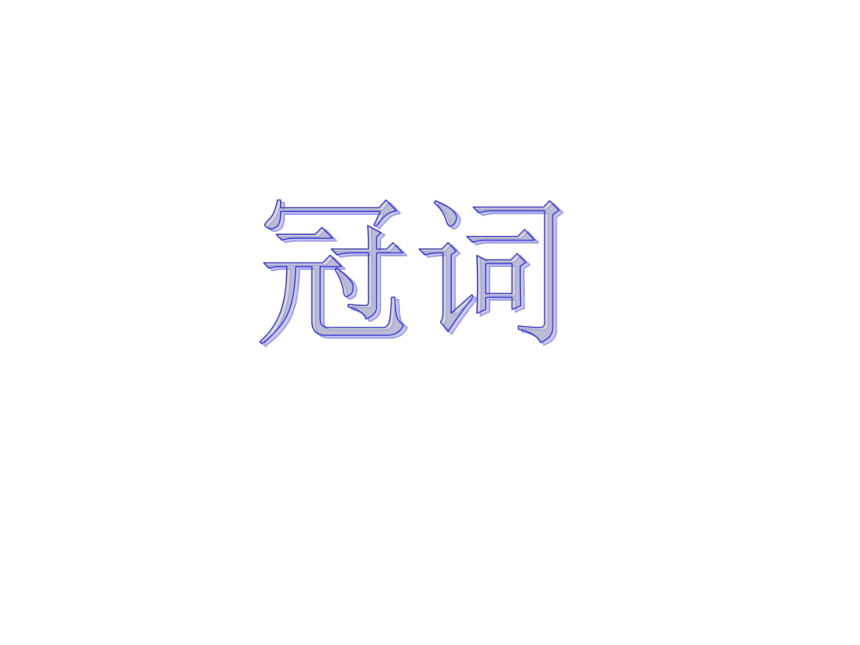
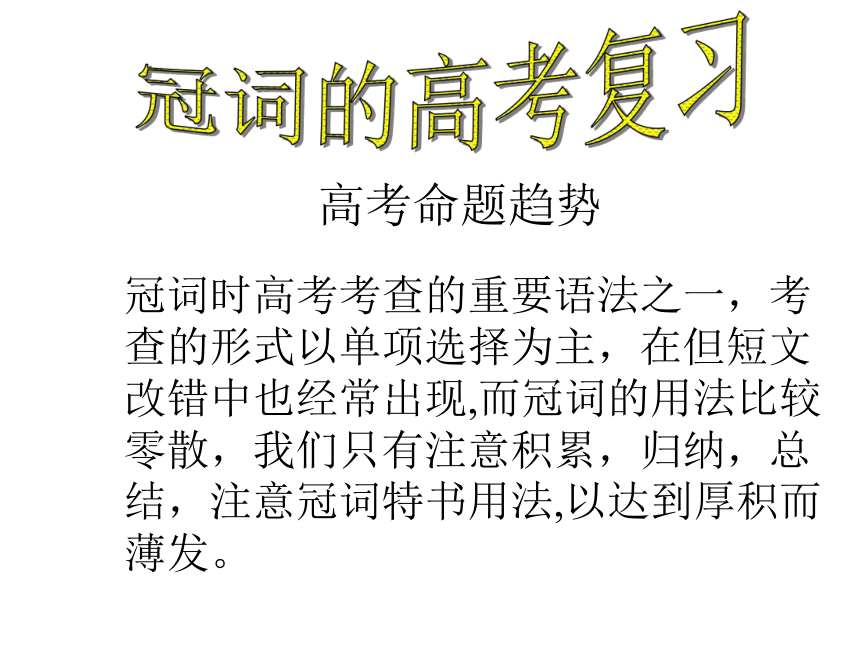
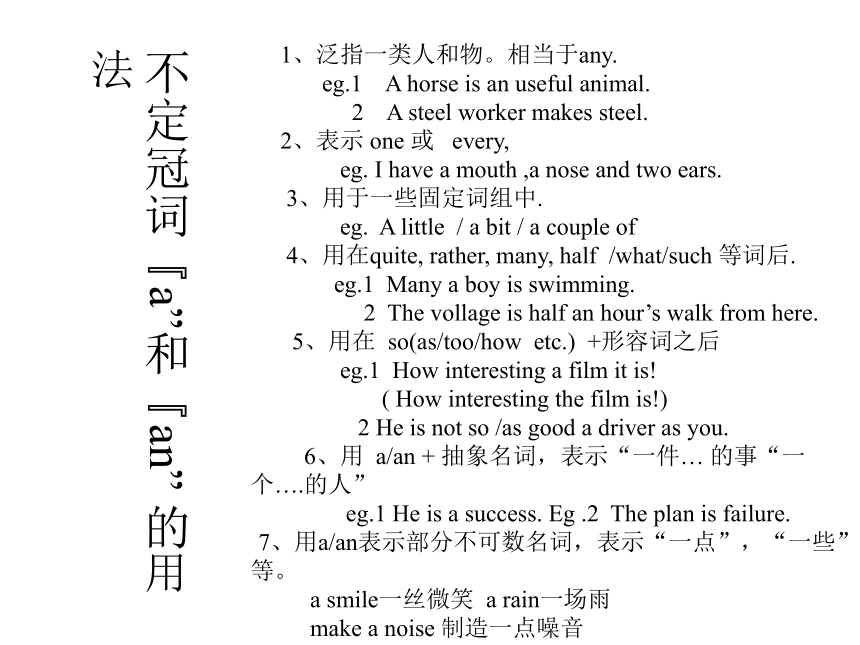
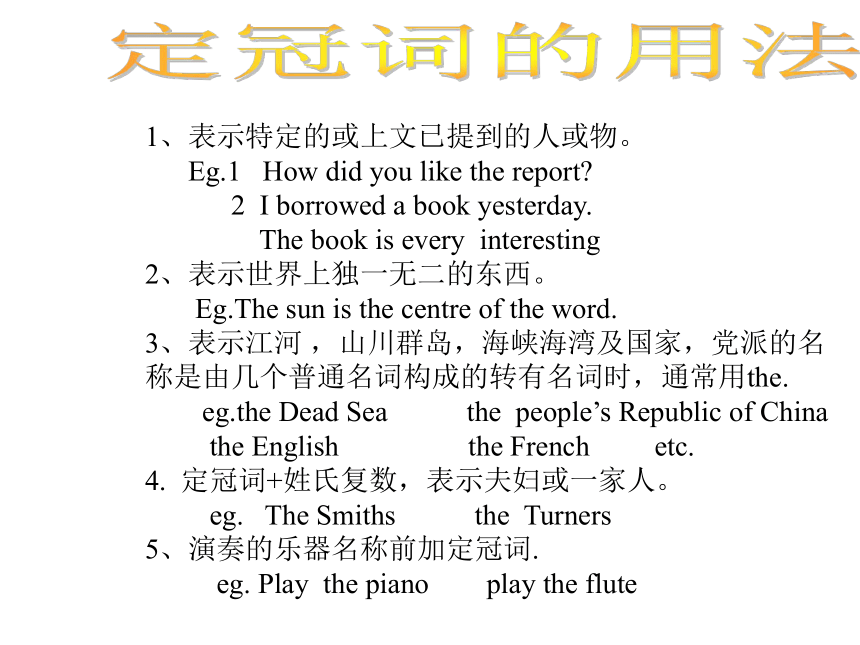
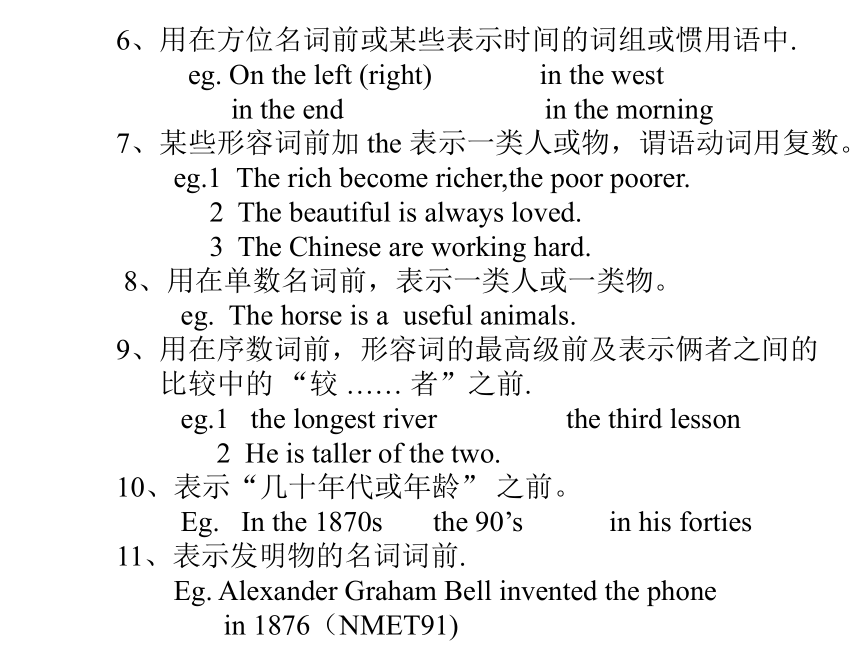
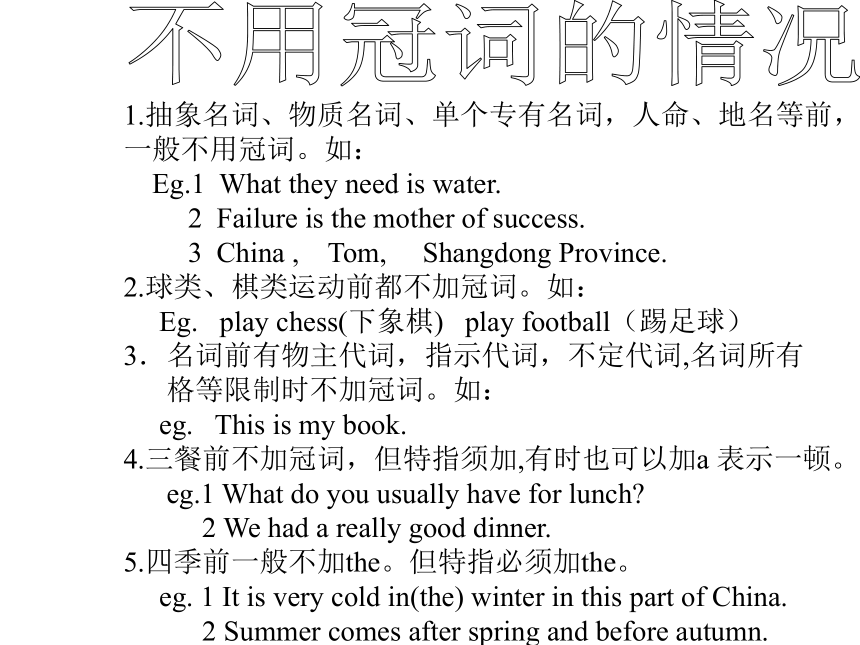
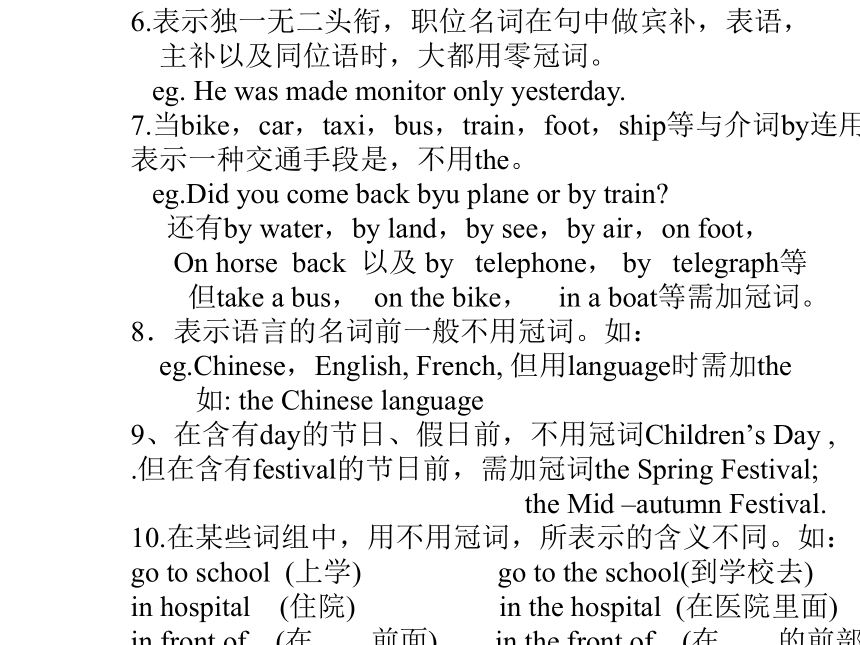
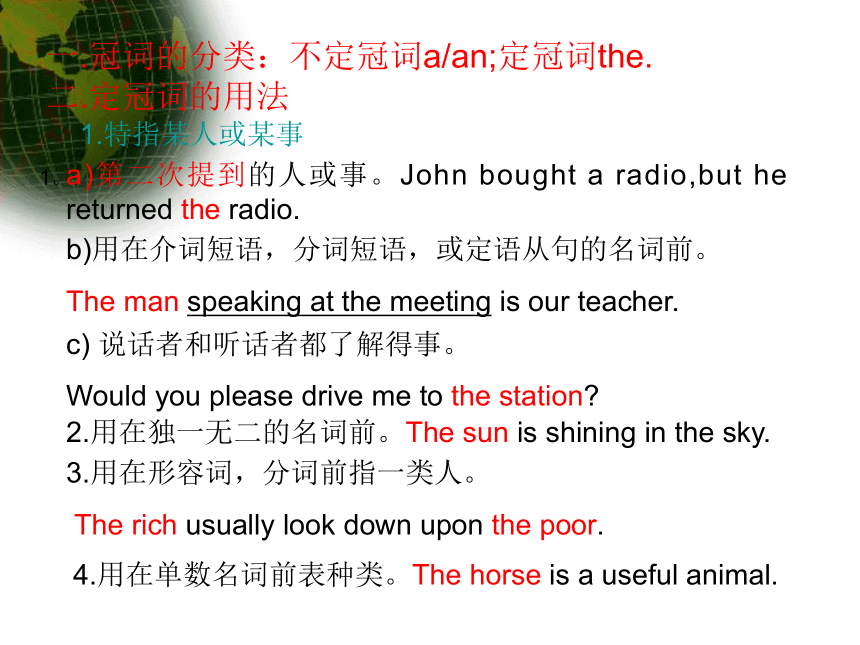
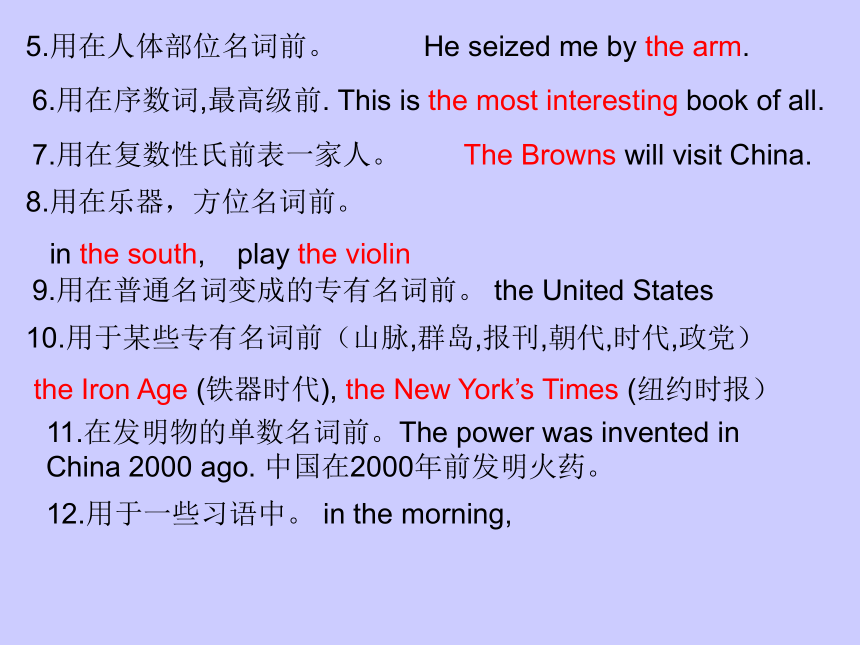
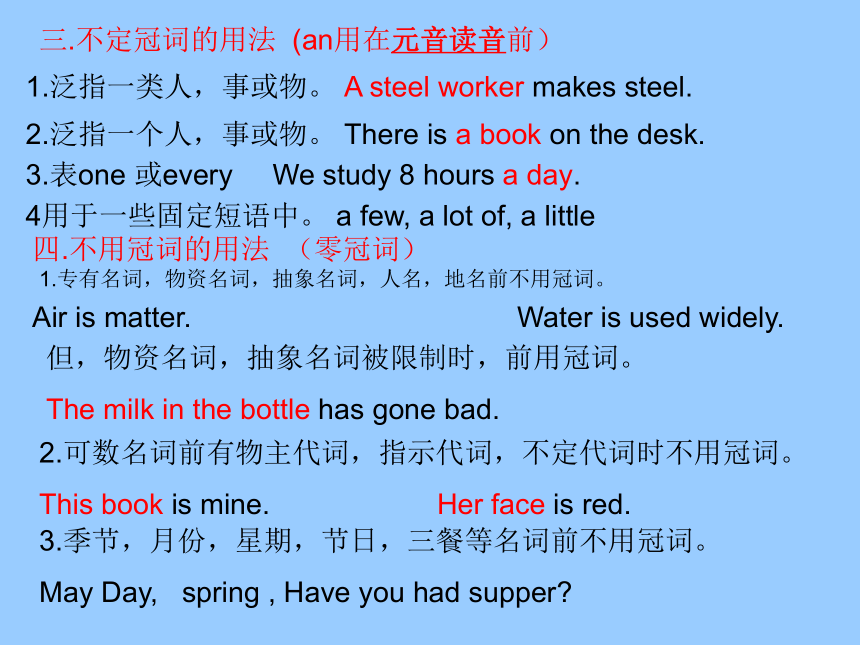
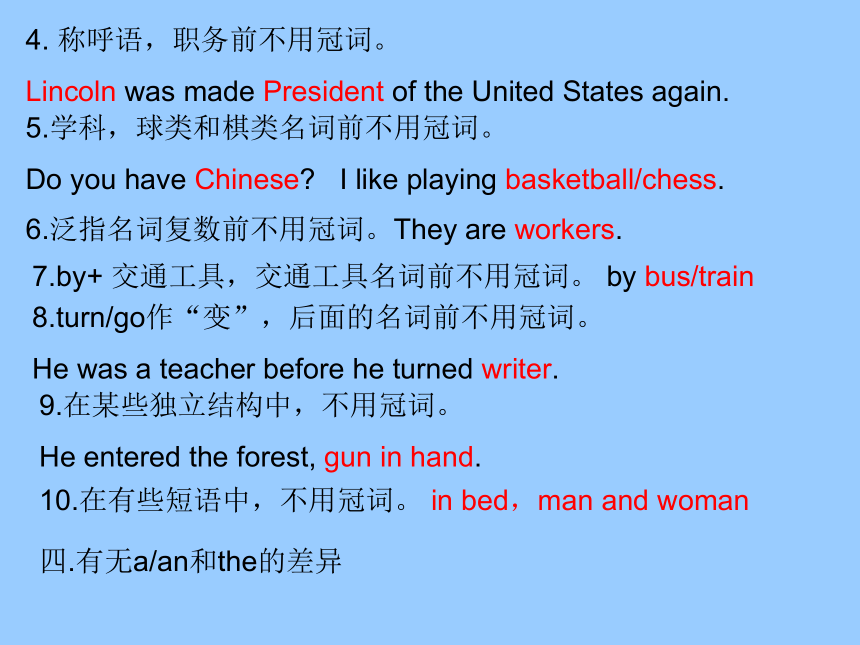
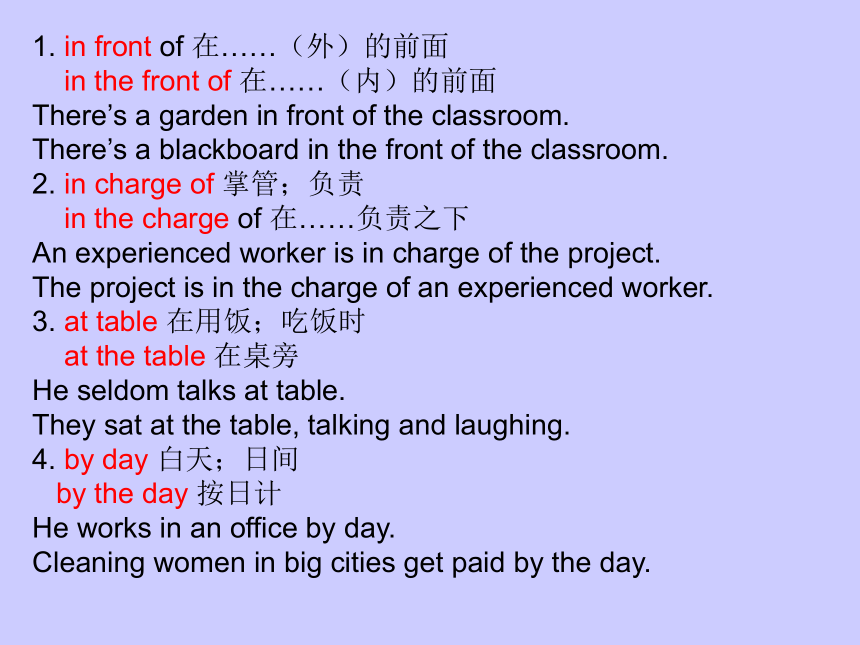
文档简介
课件58张PPT。冠词冠词时高考考查的重要语法之一,考查的形式以单项选择为主,在但短文改错中也经常出现,而冠词的用法比较零散,我们只有注意积累,归纳,总结,注意冠词特书用法,以达到厚积而薄发。冠词的高考复习高考命题趋势 1、泛指一类人和物。相当于any.
eg.1 A horse is an useful animal.
2 A steel worker makes steel.
2、表示 one 或 every,
eg. I have a mouth ,a nose and two ears.
3、用于一些固定词组中.
eg. A little / a bit / a couple of
4、用在quite, rather, many, half /what/such 等词后.
eg.1 Many a boy is swimming.
2 The vollage is half an hour’s walk from here.
5、用在 so(as/too/how etc.) +形容词之后
eg.1 How interesting a film it is!
( How interesting the film is!)
2 He is not so /as good a driver as you.
6、用 a/an + 抽象名词,表示“一件… 的事“一个….的人”
eg.1 He is a success. Eg .2 The plan is failure.
7、用a/an表示部分不可数名词,表示“一点”,“一些”等。
a smile一丝微笑 a rain一场雨
make a noise 制造一点噪音 不定冠词“a”和“an” 的用法
1、表示特定的或上文已提到的人或物。
Eg.1 How did you like the report?
2 I borrowed a book yesterday.
The book is every interesting
2、表示世界上独一无二的东西。
Eg.The sun is the centre of the word.
3、表示江河 ,山川群岛,海峡海湾及国家,党派的名称是由几个普通名词构成的转有名词时,通常用the.
eg.the Dead Sea the people’s Republic of China
the English the French etc.
4. 定冠词+姓氏复数,表示夫妇或一家人。
eg. The Smiths the Turners
5、演奏的乐器名称前加定冠词.
eg. Play the piano play the flute
定冠词的用法6、用在方位名词前或某些表示时间的词组或惯用语中.
eg. On the left (right) in the west
in the end in the morning
7、某些形容词前加 the 表示一类人或物,谓语动词用复数。
eg.1 The rich become richer,the poor poorer.
2 The beautiful is always loved.
3 The Chinese are working hard.
8、用在单数名词前,表示一类人或一类物。
eg. The horse is a useful animals.
9、用在序数词前,形容词的最高级前及表示俩者之间的
比较中的 “较 …… 者”之前.
eg.1 the longest river the third lesson
2 He is taller of the two.
10、表示“几十年代或年龄” 之前。
Eg. In the 1870s the 90’s in his forties
11、表示发明物的名词词前.
Eg. Alexander Graham Bell invented the phone
in 1876(NMET91)不用冠词的情况1.抽象名词、物质名词、单个专有名词,人命、地名等前,
一般不用冠词。如:
Eg.1 What they need is water.
2 Failure is the mother of success.
3 China , Tom, Shangdong Province.
2.球类、棋类运动前都不加冠词。如:
Eg. play chess(下象棋) play football(踢足球)
3.名词前有物主代词,指示代词,不定代词,名词所有
格等限制时不加冠词。如:
eg. This is my book.
4.三餐前不加冠词,但特指须加,有时也可以加a 表示一顿。
eg.1 What do you usually have for lunch?
2 We had a really good dinner.
5.四季前一般不加the。但特指必须加the。
eg. 1 It is very cold in(the) winter in this part of China.
2 Summer comes after spring and before autumn.
6.表示独一无二头衔,职位名词在句中做宾补,表语,
主补以及同位语时,大都用零冠词。
eg. He was made monitor only yesterday.
7.当bike,car,taxi,bus,train,foot,ship等与介词by连用,
表示一种交通手段是,不用the。
eg.Did you come back byu plane or by train?
还有by water,by land,by see,by air,on foot,
On horse back 以及 by telephone, by telegraph等
但take a bus, on the bike, in a boat等需加冠词。
8.表示语言的名词前一般不用冠词。如:
eg.Chinese,English, French, 但用language时需加the
如: the Chinese language
9、在含有day的节日、假日前,不用冠词Children’s Day ,
.但在含有festival的节日前,需加冠词the Spring Festival;
the Mid –autumn Festival.
10.在某些词组中,用不用冠词,所表示的含义不同。如:
go to school (上学) go to the school(到学校去)
in hospital (住院) in the hospital (在医院里面)
in front of (在……前面) in the front of (在……的前部)
一.冠词的分类:不定冠词a/an;定冠词the.二.定冠词的用法1。1.特指某人或某事a)第二次提到的人或事。John bought a radio,but he returned the radio.b)用在介词短语,分词短语,或定语从句的名词前。
The man speaking at the meeting is our teacher.c) 说话者和听话者都了解得事。
Would you please drive me to the station?2.用在独一无二的名词前。The sun is shining in the sky.3.用在形容词,分词前指一类人。
The rich usually look down upon the poor.4.用在单数名词前表种类。The horse is a useful animal.5.用在人体部位名词前。 He seized me by the arm.6.用在序数词,最高级前. This is the most interesting book of all.7.用在复数性氏前表一家人。 The Browns will visit China.8.用在乐器,方位名词前。
in the south, play the violin9.用在普通名词变成的专有名词前。 the United States10.用于某些专有名词前(山脉,群岛,报刊,朝代,时代,政党)
the Iron Age (铁器时代), the New York’s Times (纽约时报)12.用于一些习语中。 in the morning,11.在发明物的单数名词前。The power was invented in China 2000 ago. 中国在2000年前发明火药。三.不定冠词的用法 (an用在元音读音前)1.泛指一类人,事或物。 A steel worker makes steel.2.泛指一个人,事或物。 There is a book on the desk.3.表one 或every We study 8 hours a day.4用于一些固定短语中。 a few, a lot of, a little四.不用冠词的用法 (零冠词)1.专有名词,物资名词,抽象名词,人名,地名前不用冠词。Air is matter. Water is used widely.但,物资名词,抽象名词被限制时,前用冠词。
The milk in the bottle has gone bad.2.可数名词前有物主代词,指示代词,不定代词时不用冠词。
This book is mine. Her face is red.3.季节,月份,星期,节日,三餐等名词前不用冠词。
May Day, spring , Have you had supper?4. 称呼语,职务前不用冠词。
Lincoln was made President of the United States again.5.学科,球类和棋类名词前不用冠词。
Do you have Chinese? I like playing basketball/chess.6.泛指名词复数前不用冠词。They are workers.7.by+ 交通工具,交通工具名词前不用冠词。 by bus/train8.turn/go作“变”,后面的名词前不用冠词。
He was a teacher before he turned writer.9.在某些独立结构中,不用冠词。
He entered the forest, gun in hand.10.在有些短语中,不用冠词。 in bed,man and woman四.有无a/an和the的差异1. in front of 在……(外)的前面
in the front of 在……(内)的前面
There’s a garden in front of the classroom.
There’s a blackboard in the front of the classroom.
2. in charge of 掌管;负责
in the charge of 在……负责之下
An experienced worker is in charge of the project.
The project is in the charge of an experienced worker.
3. at table 在用饭;吃饭时
at the table 在桌旁
He seldom talks at table.
They sat at the table, talking and laughing.
4. by day 白天;日间
by the day 按日计
He works in an office by day.
Cleaning women in big cities get paid by the day. 5. take place 发生;举行
take the place 代替;接替
When did this conversation take place?
Electric train has now taken the place of steam trains in England.
6. in words 用言语
in a word 总之
Please express your thought in words.
In a word, I don’t trust you.
7. at times 有时;不时
at a time 一次
I do feel a little nervous at times.
Pass me the bricks two at a time.
8. little 少;不多的
a little 一些;一点点
Hurry up, there’s little time left.
Don’t hurry, you still have a little time.
9. few 很少;几乎没有的
a few 有些;几个
He is a man of few words.
Only a few of the children can read.
10.a most interesting 非常有趣的
the most interesting 最有趣的(形容词的最高级)
This is a most interesting story.
This is the most interesting story of the three.
11.a doctor and nurse 一位医生兼护士
a doctor and a nurse 一位医生和一位护士
A doctor and nurse is standing there.
A doctor and a nurse are standing there.
12.a number of 许多;好些
the number of …(的)数目
A number of students are in the classroom.
The number of students in the classroom is forty. 五.特殊用法 (考试重点)1.三餐饭前有形容词修饰时可接a/an。
We just had a big supper.我们刚刚吃了一顿丰盛的晚餐。2.季节,月份若有定语修饰,要加“the”。The story happed in the spring of 1945.故事发生在1945年的春天。3.在不可数名词前加a/an 表“一阵”,“一场”,“一种”等。
Physics is a science. 物理是一门科学。
A knock of the door was heard. 听到一阵敲门声。
It is a very good cheese. 这是一种很好的奶酪。
a strong wind, (一阵大风) a slight rain (一场小雨)4. 某些抽象名词前加 a/an 表“一件具体的事。
What a pleasant surprise it is! 这是一件多么令人惊呀得事!5.职务前用定冠词表特指 。
The President of the United States, Bush, signed the agreement.6.在抽象名词前加a/an表某种程度;加the(有修饰词)表特指。
A knowledge of a foreign language is necessary.
一定程度的外语知识是必要的。
China has a long history. 中国有着悠久的历史。
He studies the science of sound.他从事声学研究。7.上下文中出现同一名词,但各有所指 ,名词前都用a/an。
----Have you seen a cat?
----Is it a black one?8.在序数词加a/an 表”又,再”.
If we have time, we will try a second time.9.在比较级前加 不定冠词a/an表泛指 :一个更为 ….
This is a more interesting story than what I have read.10.在比较级前加 定冠词表特指 .the +比较级+of the two.
He is the taller of the two boys.
The end名词 名词可以分为专有名词和普通名词 ,专有名词是某个(些)人,地方,机构等专有的名称,如Beijing,China等。普通名词是一类人或东西或是一个抽象概念的名词,如:book,sadness等。普通名词又可分为下面四类:
1)个体名词:表示某类人或东西中的个体,
如:gun。
2)集体名词:表示若干个个体组成的集合体,
如:family。
3)物质名词:表示无法分为个体的实物,
如:air。
4)抽象名词:表示动作、状态、品质、感情等抽象概念,如:work。
个体名词和集体名词可以用数目来计算,称为可数名词(Countable Nouns),物质名词和抽象名词一般无法用数目计算,称为不可数名词(Uncountable Nouns)。归纳一下,名词的分类可以下图表示:名词的数 不可数名词一般没有单复数之分,它包括抽
象名词、物质名词和专有名词。例如:
health, advice, glass, wood, English, America
下列名词常用作不可数名词,谓语动词须用
单数形式:
water, weather, work, rice, trouble, progress,
sugar, snow, knowledge, news, paper, luck,
information, ice, homework, fun, clothing,
baggage, equipment, furniture, butter, bread,
air, harm, soap, ink, milk, dust,coffee 可数名词有单、复数之分。可数名词的复数形式有以下几种:一般的可数名词复数形式在后面直接加 –s,
如:girls,books以s, x, ch, sh收尾的的可数名词复数在词尾
加 –es,如:classes, boxes, matches,
dishes以“辅音字母+y”结尾的可数名词复数,
将y变为i再加 –es,如:cities, factories 但以“元音字母+y”结尾的可数名词复数则直接加-s,如:keys,toys,days 以-f,-fe 结尾的可数名词复数多将 f 改成 v 再加-es,如:leaf, wolf, knife, self, life, thief, loaf
但也有直接加 –s 的,如:gulf, chief, belief, roof, proof
handkerchief(手帕,手绢)的复数形式两者都可以。 以字母 O 结尾的可数名词复数有些直接加
–s,如:radios, zoos, studios, kilos, pianos
还有些加 –es,如:heroes, Negroes,
potatoes, tomatoes 不规则的名词复数形式,如:child, foot, tooth, man, woman, mouse, goose, ox 单复数同形的可数名词,如:Chinese,
Japanese, sheep, deer, means, works(工厂;作品),fish, series(系列;套)
※以及汉语中的度量衡单位,如:yuan, jin, mu 某些合成名词的复数形式,如:grown-up, son-in-law, looker-on, passer-by 有些名词的复数形式可以表示特别的意思,如:goods(货物), looks(外貌), times(时代), brains(脑力,智力), woods(树林),spirits(情绪,兴致),
customs(海关),sands(沙滩,沙地)几个名词的特殊用法 hair
_______________. (他的头发是白的。)
______________________. (他有几根白的头发。)His hair is whiteHe has a few white hairs fruit
The fruit is sweet.
He likes pears, peaches, grapes and other
fruits. police
The police _______ searching for the murderer.weredozen, score
two (many, several) dozen pencils
three _________ them / these pencils
dozens of students
two score of students
scores of peopledozen ofword(消息,通知), man(人类),前面不加冠词,也不用复数形式,谓语用单数。名词的格名词的格分为普通格和所有格两种。
所有格的形式:
一般的名词所有格在后面加 ’s,如:Mary’s book
以 –s 结尾的复数名词所有格在后面仅加 ’,如: Teachers’ Day, the students’ reading-room
以 –s 结尾的专有名词所有格,如:Engels’s works或Engels’ works’s 结尾的所有格形式多用于有生命的东西的名词。但有时其它的名词也可以,如:today’s newspaper, fifteen minutes’ ride等与时间有关的名词。
凡不能加 ’s 构成所有格的名词,都可以与 of 结成短语,来表示所有格关系。就是有生命的东西的名词也可如此,特别是当这个名词有较长的定语时。如:
Do you know the name of the girl standing at the gate?一个名词所有格所修饰的词,如果前面已经提到,往往可以省略,避免前后重复。如:
This is not my pen, but Mary’s.
有时某些 ’s 结尾的所有格形式可以表示地点,如某人的家或店铺、教堂等:
We can meet at Mary’s.
He went to his sister’s for dinner yesterday.
I had the dress made at the tailor’s at the corner of the street.
Last week we visited St. Paul’s. 双重所有格
’s 结尾的名词所有格有时可以与 of 连用构成双重所有格形式,这种情况主要用于:
1.它所修饰的名词前面有一个表数量的词,如:
They saw a play of Cao Yu’s.
Some friends of my brother’s will come to join us.
2.它所修饰的名词前面有一个指示代词,使句子带有赞赏或厌恶等感彩,如:
This performance of the teachers’ is wonderful.
I hate that pride of Mary’s.
A page of ________ is missing.
Henry is the son of __________.
The death of _____________ made him sad.the booka teacherhis best friend名词在句子中可作主语、宾语表语定语补语等。
名词作定语时,需注意:
an enemy soldier
several _______________
a boy student three ____________
a man teacher three _____________
a woman doctor three ______________
___________ (一家鞋店)名词在句子中的作用enemy soldiersboy studentsmen teacherswomen doctorsa shoe store heart trouble snow mountain
hearty welcome snowy table-cloth
rain drops stone house
rainy season stony heart
rose garden
rosy face
gold ring
golden sunshine/times/age/wedding1. _______ turn green in spring. (NMET 1986)
A. Leaf B. Leafs C. Leave D. Leaves
2. He dropped the _______ and broke it.
A. cup of coffee B. coffee’s cup
C. cup for coffee D. coffee cup (NMET 1993)
3. I need _______ cloth, for I’m going to make
_______ clothes. (上海 1993)
A. a lot of; many B. much; much
C. many; many D. many; a lot历年高考试题4. He gained his _______ by printing _______
of famous writers. (NMET 1995)
A. wealth; work B. wealths; works
C. wealths; work D. wealth; works
5. Many countries are increasing their use of
natural gas, wind and other forms of _______.
A. energy B. source C. power D. material
(上海 1996)
6. You’ll find this map of great _______ in
helping you to get round London. (NMET 1998)
A. price B. cost C. value D. usefulness7. ---- Who did you spend last weekend with?
---- _______ . (上海 1998)
A. Palmer’s B. The Palmers’
C. The Palmers D. The Palmer’s
8. My parents always let me have my own
_______ of living. (上海 1998)
A. way B. method C. manner D. fashion
9. The lion is considered the king of the forest
as it is a(n) _______ of courage and power.
A. example B. sign C. mark D. symbol
(上海 1998)10. We volunteered to collect money to help the _______ of the earthquake. (上海 1998)
A. victims B. folks C. fellows D. villagers
11. If you don’t take away all your things from
the desk, there won’t be enough _______ for
my stationery. (上海 1998)
A. area B. place C. room D. surface
12. It is widely accepted that young babies
learn to do things because certain acts lead
to _______ . (上海 2000)
A. rewards B. prizes
C. awards D. results13. In the botanic garden we can find a(n)
_______ of plants that range from tall trees
to small flowers. (上海 2001)
A. species B. group C. amount D. variety
14. ---- Can you shoot that bird at the top of
the tree?
---- No, it’s out of _______ . (上海 2001)
A. range B. reach C. control D. distance
15. The life of London is made up of many
different _______ . (上海 2001)
A. elements B. sections
C. material D. realities16. For the sake of her daughter’s health, she
decided to move to a warm _______ .
A. weather B. temperature
C. season D. climate (上海 2002)
17. To regain their ______ after an exhausting
game, the players lay in the grass. (上海 2002)
A. force B. energy C. power D. health
18. I saw Bob play the piano at John’s party
and on that _______ he was simply brilliant.
A. scene B. circumstance
C. occasion D. situation (上海 2002)19. It can’t be a(n) _______ that four jewelry
stores were robbed in one night. (上海 2002)
A. coincidence B. accident
C. incident D. chance
20. According to the recent research, heavy
coffee drink and heart attack is not
necessarily _______ and effect. (上海 2002)
A. reason B. impact C. fact D. cause
21. ---- I’m sorry I stepped outside for a
smoke.I was very tired.
---- There is no _______ for this while you
are on duty. (上海 2003)
A.reason B.excuse C.cause D.explanation22. The manager has got a good business
________ so the company is doing well.
A.idea B.sense
C.thought D.thinking (2003北京春季)
23. Don’t leave matches or cigarettes on the
table within ______ of little children. (2004湖北)
A. hand B. reach C. space D. distance
24. The environmentalists and wild goats’
_______ on the vast grasslands was a good indication of the better environment. (2004上海)
A. escape B. absence
C. attendance D. appearance25. The village is far away from here indeed.
It‘s _____ walk. (2004上海春季)
???? A . a four hour???????????????? B. a four hour's
???? C. a four-hours????????????? ??D. a four hours‘
26. I have read the material several times but
it doesn't make any ________ to me.
????? A. meaning? ? ?B. importance ??
C. sense? ? D. significance
(2004上海春季)
强化训练题1. My family raise a lot of _______ , including
two _______ .
A. cattles; cows B. cows; cattle
C. cattle; cows D. cow; cattles
2. He left _______ with my secretary that he
would call again in the afternoon. He said
he would keep _______ .
A. words; his words B. word; his word
C. word; word D. the word; his word3. This is an old photo of me. At that time I
_______.
A. have short hairs B. had short hair
C. have long hair D. had long hairs
4. It is bad _______ to speak with your mouth
full of food.
A. manner B. manners C. way D. thing
5. In Britain _______ are all painted red.
A. letter boxes B. letters boxes
C. letter box D. letters box
6. Mike and John’s _______ .
A. father is a teacher B. fathers are teachers
C. father are teachers D. fathers are teacher 7. Li Ming’s handwriting is better than______
in his class.
A. anyone else’s B. anyone’s else’s
C. anyone’s D. anyone else
8. ---- What does Mr Brown do for a living?
---- He’s one of the most successful ______
in the city.
A. newspaper reporter
B. newspaper’s reporters
C. newspaper’s reporter
D. newspaper reporters9. You should do more _______ . Don’t always sit at the desk busy doing your _______ .
A. exercise; exercises B. exercises; exercise
C. exercises; exercises D. exercise; exercise
10. The results of the examination _______
that you have all made great _______ .
A. show; progress B. shows; progress
C. show; progresses D. shows; progresses
11. _______ a good enough price for this book.
A. Two yuans are B. Two yuan are
C. Two yuans is D. Two yuan is 12. The wood caught fire and was soon burnt
_______.
A. ashes B. ash C. to ashes D. to ash
13. Each of the _______ in the ship.
A. passenger has his own room
B. passengers have their own room
C. passenger have their own room
D. passengers has his own room
14. “Where’s your brother?” “At _______.”
A. the Mr Green’s B. Greens
C. Mr Green’s D. the Greens15. “All _______ present and all _______
going on well.”our monitor said.
A. is; is B. are; are C. are; is D. is; are
16. He played on the ______ for two hours and
when he returned he found half his goods
______ stolen.
A. sand; were B. sand; was
C. sands; were D. sands; was
17. We have two iron _______ in our town and
a new chemical _______ is to open soon.
A. works; works B. works; work
C. work; work D. work; works18. This is _______ to an end.
A. means B. a mean
C. a means D. some mean
19. She broke a _______ while washing up.
A. glass wine B. wine glass
C. glass of wine D. glass for wine
20. Yesterday we called at ______.
A. my uncle B. a friend of my uncle’s
C. my aunts’ D. Mary’s sister’s
21. At present one third of the population here
_______ workers.
A. was B. were C. are D. is22. The Chinese people _______ a brave a
hard-working one.
A. is B. are C. have been D. were
23. There are four _______ on the farm raising
hundreds of _______ of cattle.
A. Chinese; head B. Swisses; head
C. Germans; heads D. Japaneses; heads
24. Mrs. White is a friend of _______ .
A. Mary’s mother’s B. Mary’s mother
C. mother’s of Mary D. Mary mother’s
25. The New York Times _______ a wide
circulation.
A. is B. has C. are D. have26. “How far is the bank where you work from
here?” “ It’s _______.”
A. about 300 miles’ away B. 40 minute’s walk
C. a stone’s throw D. a day or two
27. The girl’s reply was just like _______.
A. a grown-up B. that of a grown-up’s
C. those of a grown-up D. a grown-up’s
28. This is professor White’s _______ car. I
often go to Frank’s and Jerry’s in it.
A. son-in-law B. son-in-law’s
C. son’s-in-law D. friend Browns’29. After _______ absence, he found his wife
much changed.
A. a year’s or two’s B. a year or two
C. a year or two’s D. one or two year’s
30. _______ is too much for the boy to carry.
A. The box weight B. The box of weight
C. The weight of the box D. Box’s weight
31. His “Selected Poems” _______ published.
These new poems _______ not selected.
A. have been; are B. has been; are
C. has been; is D. have been; is32. Shortly after the accident, two _______
police were sent to the spot to keep order.
A. dozen of B. dozens
C. dozen D. dozens of
33. Oh, John . _______ you gave us!
A. How a pleasant surprise
B. How pleasant surprise
C. What a pleasant surprise
D. What pleasant surprise
34. I like reading. It is _______ to me.
A. happy B. delight
C. pleasure D. a pleasure35. What _______ ! We were wet all over.
A. heavy rain B. heavy rains
C. a heavy rain D. big rain
36. A cow has four _______.
A. stomachs B. stomaches
C. eyes D. stomach
37. That little daughter of _______ is really a
dear.
A. your brother B. your brother’s
C. her D. your
38. The book is full of _______.
A. difficulty B. difficult
C. difficulties D. a difficulty39. This pair of trousers _______ too long for
me. Please show me _______.
A. are; other ones B. is; another ones
C. are; another pairs D. is; another
40. The United Nations _______ a resolution.
A. has past B. have passed
C. has passed D. have past
41. That fellow is clever. He has _______.
A. a brain B. the brain
C. some brain D. brains
42. The concert was _______ because only a
few people came to it.
A. failure B. success C. a failure D. a successGoodbye!
eg.1 A horse is an useful animal.
2 A steel worker makes steel.
2、表示 one 或 every,
eg. I have a mouth ,a nose and two ears.
3、用于一些固定词组中.
eg. A little / a bit / a couple of
4、用在quite, rather, many, half /what/such 等词后.
eg.1 Many a boy is swimming.
2 The vollage is half an hour’s walk from here.
5、用在 so(as/too/how etc.) +形容词之后
eg.1 How interesting a film it is!
( How interesting the film is!)
2 He is not so /as good a driver as you.
6、用 a/an + 抽象名词,表示“一件… 的事“一个….的人”
eg.1 He is a success. Eg .2 The plan is failure.
7、用a/an表示部分不可数名词,表示“一点”,“一些”等。
a smile一丝微笑 a rain一场雨
make a noise 制造一点噪音 不定冠词“a”和“an” 的用法
1、表示特定的或上文已提到的人或物。
Eg.1 How did you like the report?
2 I borrowed a book yesterday.
The book is every interesting
2、表示世界上独一无二的东西。
Eg.The sun is the centre of the word.
3、表示江河 ,山川群岛,海峡海湾及国家,党派的名称是由几个普通名词构成的转有名词时,通常用the.
eg.the Dead Sea the people’s Republic of China
the English the French etc.
4. 定冠词+姓氏复数,表示夫妇或一家人。
eg. The Smiths the Turners
5、演奏的乐器名称前加定冠词.
eg. Play the piano play the flute
定冠词的用法6、用在方位名词前或某些表示时间的词组或惯用语中.
eg. On the left (right) in the west
in the end in the morning
7、某些形容词前加 the 表示一类人或物,谓语动词用复数。
eg.1 The rich become richer,the poor poorer.
2 The beautiful is always loved.
3 The Chinese are working hard.
8、用在单数名词前,表示一类人或一类物。
eg. The horse is a useful animals.
9、用在序数词前,形容词的最高级前及表示俩者之间的
比较中的 “较 …… 者”之前.
eg.1 the longest river the third lesson
2 He is taller of the two.
10、表示“几十年代或年龄” 之前。
Eg. In the 1870s the 90’s in his forties
11、表示发明物的名词词前.
Eg. Alexander Graham Bell invented the phone
in 1876(NMET91)不用冠词的情况1.抽象名词、物质名词、单个专有名词,人命、地名等前,
一般不用冠词。如:
Eg.1 What they need is water.
2 Failure is the mother of success.
3 China , Tom, Shangdong Province.
2.球类、棋类运动前都不加冠词。如:
Eg. play chess(下象棋) play football(踢足球)
3.名词前有物主代词,指示代词,不定代词,名词所有
格等限制时不加冠词。如:
eg. This is my book.
4.三餐前不加冠词,但特指须加,有时也可以加a 表示一顿。
eg.1 What do you usually have for lunch?
2 We had a really good dinner.
5.四季前一般不加the。但特指必须加the。
eg. 1 It is very cold in(the) winter in this part of China.
2 Summer comes after spring and before autumn.
6.表示独一无二头衔,职位名词在句中做宾补,表语,
主补以及同位语时,大都用零冠词。
eg. He was made monitor only yesterday.
7.当bike,car,taxi,bus,train,foot,ship等与介词by连用,
表示一种交通手段是,不用the。
eg.Did you come back byu plane or by train?
还有by water,by land,by see,by air,on foot,
On horse back 以及 by telephone, by telegraph等
但take a bus, on the bike, in a boat等需加冠词。
8.表示语言的名词前一般不用冠词。如:
eg.Chinese,English, French, 但用language时需加the
如: the Chinese language
9、在含有day的节日、假日前,不用冠词Children’s Day ,
.但在含有festival的节日前,需加冠词the Spring Festival;
the Mid –autumn Festival.
10.在某些词组中,用不用冠词,所表示的含义不同。如:
go to school (上学) go to the school(到学校去)
in hospital (住院) in the hospital (在医院里面)
in front of (在……前面) in the front of (在……的前部)
一.冠词的分类:不定冠词a/an;定冠词the.二.定冠词的用法1。1.特指某人或某事a)第二次提到的人或事。John bought a radio,but he returned the radio.b)用在介词短语,分词短语,或定语从句的名词前。
The man speaking at the meeting is our teacher.c) 说话者和听话者都了解得事。
Would you please drive me to the station?2.用在独一无二的名词前。The sun is shining in the sky.3.用在形容词,分词前指一类人。
The rich usually look down upon the poor.4.用在单数名词前表种类。The horse is a useful animal.5.用在人体部位名词前。 He seized me by the arm.6.用在序数词,最高级前. This is the most interesting book of all.7.用在复数性氏前表一家人。 The Browns will visit China.8.用在乐器,方位名词前。
in the south, play the violin9.用在普通名词变成的专有名词前。 the United States10.用于某些专有名词前(山脉,群岛,报刊,朝代,时代,政党)
the Iron Age (铁器时代), the New York’s Times (纽约时报)12.用于一些习语中。 in the morning,11.在发明物的单数名词前。The power was invented in China 2000 ago. 中国在2000年前发明火药。三.不定冠词的用法 (an用在元音读音前)1.泛指一类人,事或物。 A steel worker makes steel.2.泛指一个人,事或物。 There is a book on the desk.3.表one 或every We study 8 hours a day.4用于一些固定短语中。 a few, a lot of, a little四.不用冠词的用法 (零冠词)1.专有名词,物资名词,抽象名词,人名,地名前不用冠词。Air is matter. Water is used widely.但,物资名词,抽象名词被限制时,前用冠词。
The milk in the bottle has gone bad.2.可数名词前有物主代词,指示代词,不定代词时不用冠词。
This book is mine. Her face is red.3.季节,月份,星期,节日,三餐等名词前不用冠词。
May Day, spring , Have you had supper?4. 称呼语,职务前不用冠词。
Lincoln was made President of the United States again.5.学科,球类和棋类名词前不用冠词。
Do you have Chinese? I like playing basketball/chess.6.泛指名词复数前不用冠词。They are workers.7.by+ 交通工具,交通工具名词前不用冠词。 by bus/train8.turn/go作“变”,后面的名词前不用冠词。
He was a teacher before he turned writer.9.在某些独立结构中,不用冠词。
He entered the forest, gun in hand.10.在有些短语中,不用冠词。 in bed,man and woman四.有无a/an和the的差异1. in front of 在……(外)的前面
in the front of 在……(内)的前面
There’s a garden in front of the classroom.
There’s a blackboard in the front of the classroom.
2. in charge of 掌管;负责
in the charge of 在……负责之下
An experienced worker is in charge of the project.
The project is in the charge of an experienced worker.
3. at table 在用饭;吃饭时
at the table 在桌旁
He seldom talks at table.
They sat at the table, talking and laughing.
4. by day 白天;日间
by the day 按日计
He works in an office by day.
Cleaning women in big cities get paid by the day. 5. take place 发生;举行
take the place 代替;接替
When did this conversation take place?
Electric train has now taken the place of steam trains in England.
6. in words 用言语
in a word 总之
Please express your thought in words.
In a word, I don’t trust you.
7. at times 有时;不时
at a time 一次
I do feel a little nervous at times.
Pass me the bricks two at a time.
8. little 少;不多的
a little 一些;一点点
Hurry up, there’s little time left.
Don’t hurry, you still have a little time.
9. few 很少;几乎没有的
a few 有些;几个
He is a man of few words.
Only a few of the children can read.
10.a most interesting 非常有趣的
the most interesting 最有趣的(形容词的最高级)
This is a most interesting story.
This is the most interesting story of the three.
11.a doctor and nurse 一位医生兼护士
a doctor and a nurse 一位医生和一位护士
A doctor and nurse is standing there.
A doctor and a nurse are standing there.
12.a number of 许多;好些
the number of …(的)数目
A number of students are in the classroom.
The number of students in the classroom is forty. 五.特殊用法 (考试重点)1.三餐饭前有形容词修饰时可接a/an。
We just had a big supper.我们刚刚吃了一顿丰盛的晚餐。2.季节,月份若有定语修饰,要加“the”。The story happed in the spring of 1945.故事发生在1945年的春天。3.在不可数名词前加a/an 表“一阵”,“一场”,“一种”等。
Physics is a science. 物理是一门科学。
A knock of the door was heard. 听到一阵敲门声。
It is a very good cheese. 这是一种很好的奶酪。
a strong wind, (一阵大风) a slight rain (一场小雨)4. 某些抽象名词前加 a/an 表“一件具体的事。
What a pleasant surprise it is! 这是一件多么令人惊呀得事!5.职务前用定冠词表特指 。
The President of the United States, Bush, signed the agreement.6.在抽象名词前加a/an表某种程度;加the(有修饰词)表特指。
A knowledge of a foreign language is necessary.
一定程度的外语知识是必要的。
China has a long history. 中国有着悠久的历史。
He studies the science of sound.他从事声学研究。7.上下文中出现同一名词,但各有所指 ,名词前都用a/an。
----Have you seen a cat?
----Is it a black one?8.在序数词加a/an 表”又,再”.
If we have time, we will try a second time.9.在比较级前加 不定冠词a/an表泛指 :一个更为 ….
This is a more interesting story than what I have read.10.在比较级前加 定冠词表特指 .the +比较级+of the two.
He is the taller of the two boys.
The end名词 名词可以分为专有名词和普通名词 ,专有名词是某个(些)人,地方,机构等专有的名称,如Beijing,China等。普通名词是一类人或东西或是一个抽象概念的名词,如:book,sadness等。普通名词又可分为下面四类:
1)个体名词:表示某类人或东西中的个体,
如:gun。
2)集体名词:表示若干个个体组成的集合体,
如:family。
3)物质名词:表示无法分为个体的实物,
如:air。
4)抽象名词:表示动作、状态、品质、感情等抽象概念,如:work。
个体名词和集体名词可以用数目来计算,称为可数名词(Countable Nouns),物质名词和抽象名词一般无法用数目计算,称为不可数名词(Uncountable Nouns)。归纳一下,名词的分类可以下图表示:名词的数 不可数名词一般没有单复数之分,它包括抽
象名词、物质名词和专有名词。例如:
health, advice, glass, wood, English, America
下列名词常用作不可数名词,谓语动词须用
单数形式:
water, weather, work, rice, trouble, progress,
sugar, snow, knowledge, news, paper, luck,
information, ice, homework, fun, clothing,
baggage, equipment, furniture, butter, bread,
air, harm, soap, ink, milk, dust,coffee 可数名词有单、复数之分。可数名词的复数形式有以下几种:一般的可数名词复数形式在后面直接加 –s,
如:girls,books以s, x, ch, sh收尾的的可数名词复数在词尾
加 –es,如:classes, boxes, matches,
dishes以“辅音字母+y”结尾的可数名词复数,
将y变为i再加 –es,如:cities, factories 但以“元音字母+y”结尾的可数名词复数则直接加-s,如:keys,toys,days 以-f,-fe 结尾的可数名词复数多将 f 改成 v 再加-es,如:leaf, wolf, knife, self, life, thief, loaf
但也有直接加 –s 的,如:gulf, chief, belief, roof, proof
handkerchief(手帕,手绢)的复数形式两者都可以。 以字母 O 结尾的可数名词复数有些直接加
–s,如:radios, zoos, studios, kilos, pianos
还有些加 –es,如:heroes, Negroes,
potatoes, tomatoes 不规则的名词复数形式,如:child, foot, tooth, man, woman, mouse, goose, ox 单复数同形的可数名词,如:Chinese,
Japanese, sheep, deer, means, works(工厂;作品),fish, series(系列;套)
※以及汉语中的度量衡单位,如:yuan, jin, mu 某些合成名词的复数形式,如:grown-up, son-in-law, looker-on, passer-by 有些名词的复数形式可以表示特别的意思,如:goods(货物), looks(外貌), times(时代), brains(脑力,智力), woods(树林),spirits(情绪,兴致),
customs(海关),sands(沙滩,沙地)几个名词的特殊用法 hair
_______________. (他的头发是白的。)
______________________. (他有几根白的头发。)His hair is whiteHe has a few white hairs fruit
The fruit is sweet.
He likes pears, peaches, grapes and other
fruits. police
The police _______ searching for the murderer.weredozen, score
two (many, several) dozen pencils
three _________ them / these pencils
dozens of students
two score of students
scores of peopledozen ofword(消息,通知), man(人类),前面不加冠词,也不用复数形式,谓语用单数。名词的格名词的格分为普通格和所有格两种。
所有格的形式:
一般的名词所有格在后面加 ’s,如:Mary’s book
以 –s 结尾的复数名词所有格在后面仅加 ’,如: Teachers’ Day, the students’ reading-room
以 –s 结尾的专有名词所有格,如:Engels’s works或Engels’ works’s 结尾的所有格形式多用于有生命的东西的名词。但有时其它的名词也可以,如:today’s newspaper, fifteen minutes’ ride等与时间有关的名词。
凡不能加 ’s 构成所有格的名词,都可以与 of 结成短语,来表示所有格关系。就是有生命的东西的名词也可如此,特别是当这个名词有较长的定语时。如:
Do you know the name of the girl standing at the gate?一个名词所有格所修饰的词,如果前面已经提到,往往可以省略,避免前后重复。如:
This is not my pen, but Mary’s.
有时某些 ’s 结尾的所有格形式可以表示地点,如某人的家或店铺、教堂等:
We can meet at Mary’s.
He went to his sister’s for dinner yesterday.
I had the dress made at the tailor’s at the corner of the street.
Last week we visited St. Paul’s. 双重所有格
’s 结尾的名词所有格有时可以与 of 连用构成双重所有格形式,这种情况主要用于:
1.它所修饰的名词前面有一个表数量的词,如:
They saw a play of Cao Yu’s.
Some friends of my brother’s will come to join us.
2.它所修饰的名词前面有一个指示代词,使句子带有赞赏或厌恶等感彩,如:
This performance of the teachers’ is wonderful.
I hate that pride of Mary’s.
A page of ________ is missing.
Henry is the son of __________.
The death of _____________ made him sad.the booka teacherhis best friend名词在句子中可作主语、宾语表语定语补语等。
名词作定语时,需注意:
an enemy soldier
several _______________
a boy student three ____________
a man teacher three _____________
a woman doctor three ______________
___________ (一家鞋店)名词在句子中的作用enemy soldiersboy studentsmen teacherswomen doctorsa shoe store heart trouble snow mountain
hearty welcome snowy table-cloth
rain drops stone house
rainy season stony heart
rose garden
rosy face
gold ring
golden sunshine/times/age/wedding1. _______ turn green in spring. (NMET 1986)
A. Leaf B. Leafs C. Leave D. Leaves
2. He dropped the _______ and broke it.
A. cup of coffee B. coffee’s cup
C. cup for coffee D. coffee cup (NMET 1993)
3. I need _______ cloth, for I’m going to make
_______ clothes. (上海 1993)
A. a lot of; many B. much; much
C. many; many D. many; a lot历年高考试题4. He gained his _______ by printing _______
of famous writers. (NMET 1995)
A. wealth; work B. wealths; works
C. wealths; work D. wealth; works
5. Many countries are increasing their use of
natural gas, wind and other forms of _______.
A. energy B. source C. power D. material
(上海 1996)
6. You’ll find this map of great _______ in
helping you to get round London. (NMET 1998)
A. price B. cost C. value D. usefulness7. ---- Who did you spend last weekend with?
---- _______ . (上海 1998)
A. Palmer’s B. The Palmers’
C. The Palmers D. The Palmer’s
8. My parents always let me have my own
_______ of living. (上海 1998)
A. way B. method C. manner D. fashion
9. The lion is considered the king of the forest
as it is a(n) _______ of courage and power.
A. example B. sign C. mark D. symbol
(上海 1998)10. We volunteered to collect money to help the _______ of the earthquake. (上海 1998)
A. victims B. folks C. fellows D. villagers
11. If you don’t take away all your things from
the desk, there won’t be enough _______ for
my stationery. (上海 1998)
A. area B. place C. room D. surface
12. It is widely accepted that young babies
learn to do things because certain acts lead
to _______ . (上海 2000)
A. rewards B. prizes
C. awards D. results13. In the botanic garden we can find a(n)
_______ of plants that range from tall trees
to small flowers. (上海 2001)
A. species B. group C. amount D. variety
14. ---- Can you shoot that bird at the top of
the tree?
---- No, it’s out of _______ . (上海 2001)
A. range B. reach C. control D. distance
15. The life of London is made up of many
different _______ . (上海 2001)
A. elements B. sections
C. material D. realities16. For the sake of her daughter’s health, she
decided to move to a warm _______ .
A. weather B. temperature
C. season D. climate (上海 2002)
17. To regain their ______ after an exhausting
game, the players lay in the grass. (上海 2002)
A. force B. energy C. power D. health
18. I saw Bob play the piano at John’s party
and on that _______ he was simply brilliant.
A. scene B. circumstance
C. occasion D. situation (上海 2002)19. It can’t be a(n) _______ that four jewelry
stores were robbed in one night. (上海 2002)
A. coincidence B. accident
C. incident D. chance
20. According to the recent research, heavy
coffee drink and heart attack is not
necessarily _______ and effect. (上海 2002)
A. reason B. impact C. fact D. cause
21. ---- I’m sorry I stepped outside for a
smoke.I was very tired.
---- There is no _______ for this while you
are on duty. (上海 2003)
A.reason B.excuse C.cause D.explanation22. The manager has got a good business
________ so the company is doing well.
A.idea B.sense
C.thought D.thinking (2003北京春季)
23. Don’t leave matches or cigarettes on the
table within ______ of little children. (2004湖北)
A. hand B. reach C. space D. distance
24. The environmentalists and wild goats’
_______ on the vast grasslands was a good indication of the better environment. (2004上海)
A. escape B. absence
C. attendance D. appearance25. The village is far away from here indeed.
It‘s _____ walk. (2004上海春季)
???? A . a four hour???????????????? B. a four hour's
???? C. a four-hours????????????? ??D. a four hours‘
26. I have read the material several times but
it doesn't make any ________ to me.
????? A. meaning? ? ?B. importance ??
C. sense? ? D. significance
(2004上海春季)
强化训练题1. My family raise a lot of _______ , including
two _______ .
A. cattles; cows B. cows; cattle
C. cattle; cows D. cow; cattles
2. He left _______ with my secretary that he
would call again in the afternoon. He said
he would keep _______ .
A. words; his words B. word; his word
C. word; word D. the word; his word3. This is an old photo of me. At that time I
_______.
A. have short hairs B. had short hair
C. have long hair D. had long hairs
4. It is bad _______ to speak with your mouth
full of food.
A. manner B. manners C. way D. thing
5. In Britain _______ are all painted red.
A. letter boxes B. letters boxes
C. letter box D. letters box
6. Mike and John’s _______ .
A. father is a teacher B. fathers are teachers
C. father are teachers D. fathers are teacher 7. Li Ming’s handwriting is better than______
in his class.
A. anyone else’s B. anyone’s else’s
C. anyone’s D. anyone else
8. ---- What does Mr Brown do for a living?
---- He’s one of the most successful ______
in the city.
A. newspaper reporter
B. newspaper’s reporters
C. newspaper’s reporter
D. newspaper reporters9. You should do more _______ . Don’t always sit at the desk busy doing your _______ .
A. exercise; exercises B. exercises; exercise
C. exercises; exercises D. exercise; exercise
10. The results of the examination _______
that you have all made great _______ .
A. show; progress B. shows; progress
C. show; progresses D. shows; progresses
11. _______ a good enough price for this book.
A. Two yuans are B. Two yuan are
C. Two yuans is D. Two yuan is 12. The wood caught fire and was soon burnt
_______.
A. ashes B. ash C. to ashes D. to ash
13. Each of the _______ in the ship.
A. passenger has his own room
B. passengers have their own room
C. passenger have their own room
D. passengers has his own room
14. “Where’s your brother?” “At _______.”
A. the Mr Green’s B. Greens
C. Mr Green’s D. the Greens15. “All _______ present and all _______
going on well.”our monitor said.
A. is; is B. are; are C. are; is D. is; are
16. He played on the ______ for two hours and
when he returned he found half his goods
______ stolen.
A. sand; were B. sand; was
C. sands; were D. sands; was
17. We have two iron _______ in our town and
a new chemical _______ is to open soon.
A. works; works B. works; work
C. work; work D. work; works18. This is _______ to an end.
A. means B. a mean
C. a means D. some mean
19. She broke a _______ while washing up.
A. glass wine B. wine glass
C. glass of wine D. glass for wine
20. Yesterday we called at ______.
A. my uncle B. a friend of my uncle’s
C. my aunts’ D. Mary’s sister’s
21. At present one third of the population here
_______ workers.
A. was B. were C. are D. is22. The Chinese people _______ a brave a
hard-working one.
A. is B. are C. have been D. were
23. There are four _______ on the farm raising
hundreds of _______ of cattle.
A. Chinese; head B. Swisses; head
C. Germans; heads D. Japaneses; heads
24. Mrs. White is a friend of _______ .
A. Mary’s mother’s B. Mary’s mother
C. mother’s of Mary D. Mary mother’s
25. The New York Times _______ a wide
circulation.
A. is B. has C. are D. have26. “How far is the bank where you work from
here?” “ It’s _______.”
A. about 300 miles’ away B. 40 minute’s walk
C. a stone’s throw D. a day or two
27. The girl’s reply was just like _______.
A. a grown-up B. that of a grown-up’s
C. those of a grown-up D. a grown-up’s
28. This is professor White’s _______ car. I
often go to Frank’s and Jerry’s in it.
A. son-in-law B. son-in-law’s
C. son’s-in-law D. friend Browns’29. After _______ absence, he found his wife
much changed.
A. a year’s or two’s B. a year or two
C. a year or two’s D. one or two year’s
30. _______ is too much for the boy to carry.
A. The box weight B. The box of weight
C. The weight of the box D. Box’s weight
31. His “Selected Poems” _______ published.
These new poems _______ not selected.
A. have been; are B. has been; are
C. has been; is D. have been; is32. Shortly after the accident, two _______
police were sent to the spot to keep order.
A. dozen of B. dozens
C. dozen D. dozens of
33. Oh, John . _______ you gave us!
A. How a pleasant surprise
B. How pleasant surprise
C. What a pleasant surprise
D. What pleasant surprise
34. I like reading. It is _______ to me.
A. happy B. delight
C. pleasure D. a pleasure35. What _______ ! We were wet all over.
A. heavy rain B. heavy rains
C. a heavy rain D. big rain
36. A cow has four _______.
A. stomachs B. stomaches
C. eyes D. stomach
37. That little daughter of _______ is really a
dear.
A. your brother B. your brother’s
C. her D. your
38. The book is full of _______.
A. difficulty B. difficult
C. difficulties D. a difficulty39. This pair of trousers _______ too long for
me. Please show me _______.
A. are; other ones B. is; another ones
C. are; another pairs D. is; another
40. The United Nations _______ a resolution.
A. has past B. have passed
C. has passed D. have past
41. That fellow is clever. He has _______.
A. a brain B. the brain
C. some brain D. brains
42. The concert was _______ because only a
few people came to it.
A. failure B. success C. a failure D. a successGoodbye!
